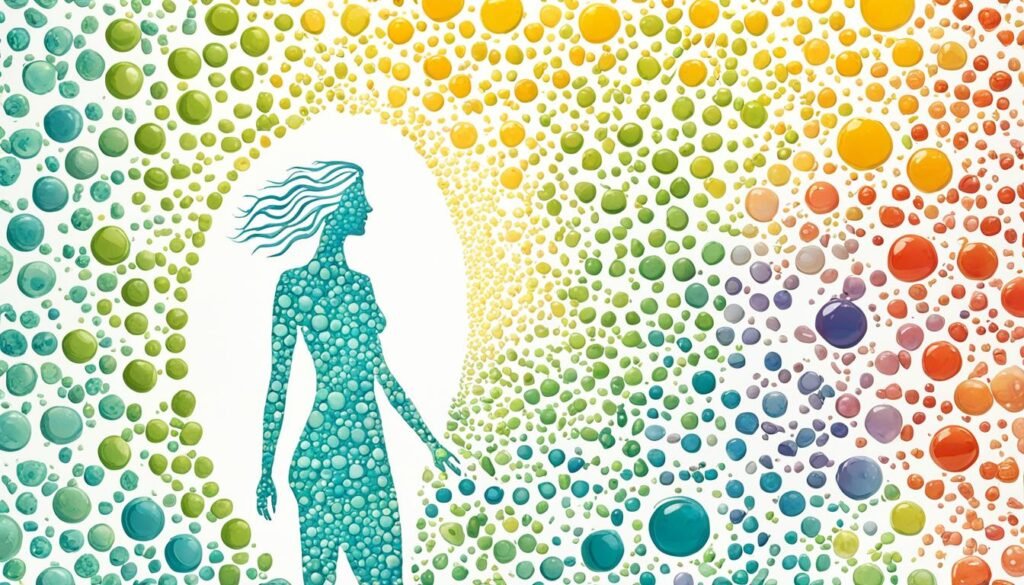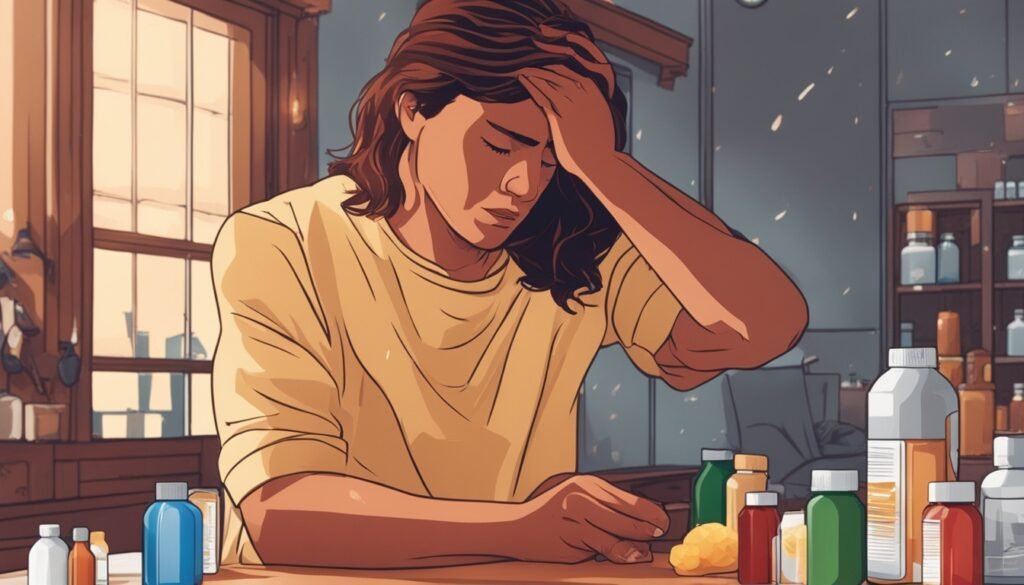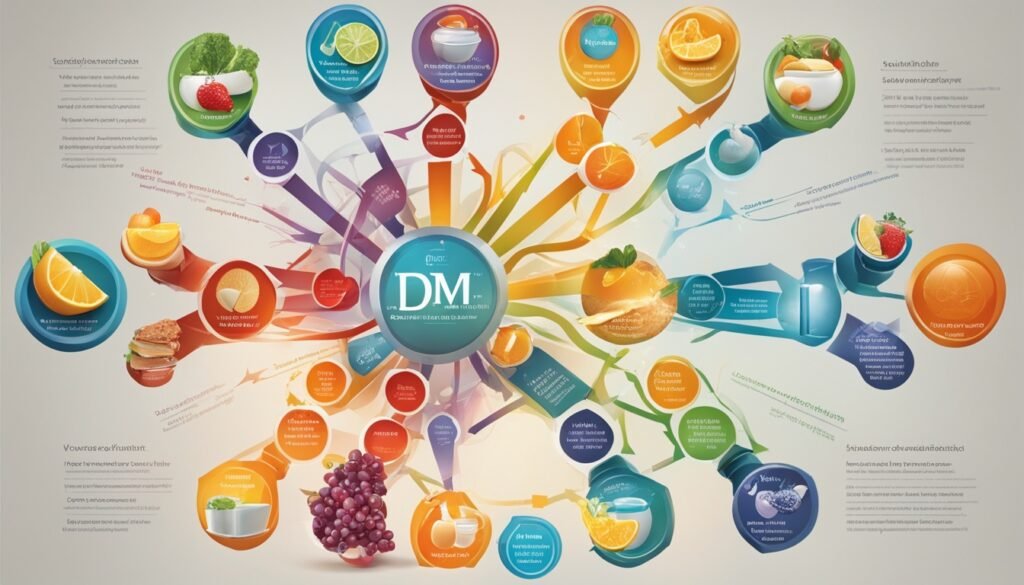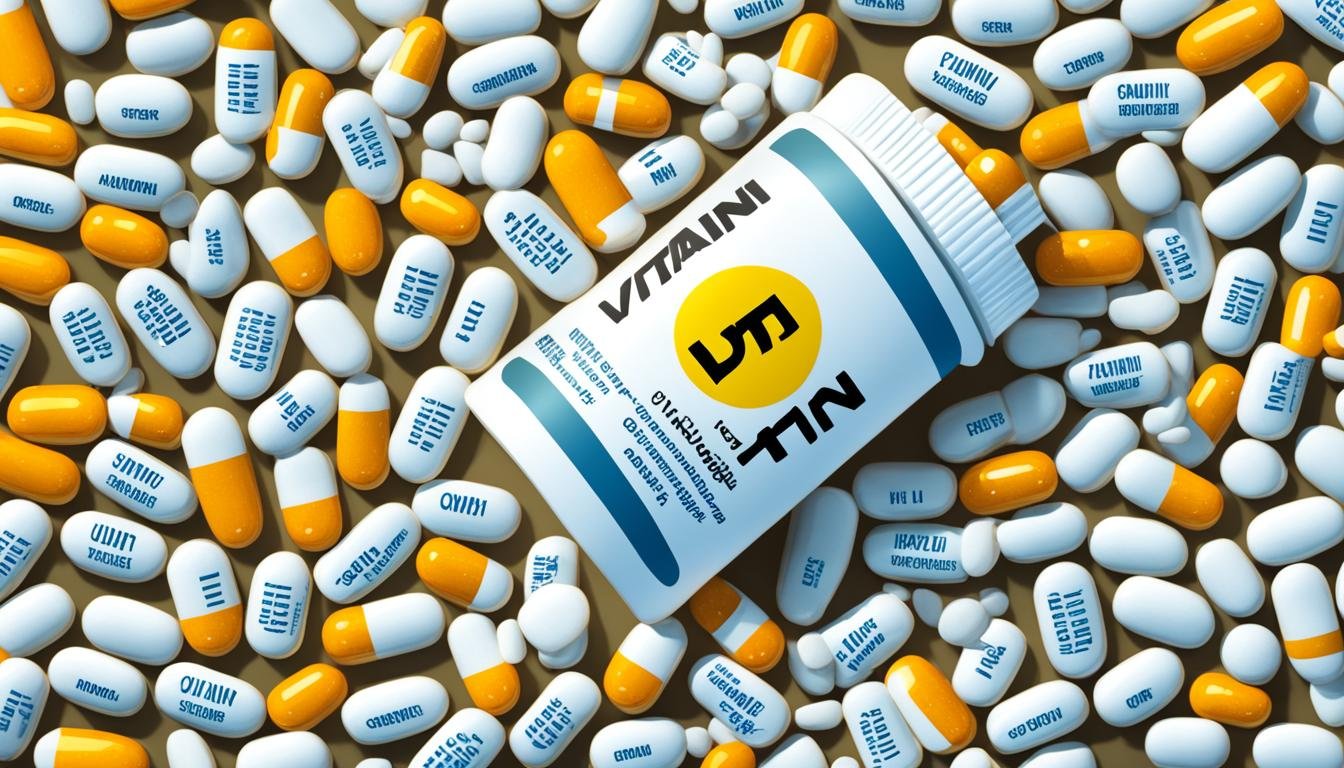Having too much of a good thing can actually be harmful, especially for essential vitamins like vitamin D and iron. A whopping1 90% of Americans are lacking in vitamin D. Paradoxically, overdoing it on supplements results in a bunch of bad effects.2 Too much vitamin D can lead to high blood levels, feeling sick, and kidney issues. In the worst cases, it might even lead to coma or death.
Yet, the perils don’t solely focus on vitamin D. Too high an intake of iron is just as risky. It can cause various stomach problems, making you feel sick, and forcing you to vomit. In very bad scenarios, it can also damage your organs and induce a coma. People suffering from hemochromatosis, a condition that makes you absorb too much iron, are at even greater risk.
In this piece, we’ll delve deep into the risks of overdoing it on vitamins D and iron. We’ll guide you on how to keep a smart balance of these vital nutrients. Learning how vitamin D and iron aid our bodies and how to spot the signs of too much will help you stay safe. Our goal is for you to manage your supplement intake with confidence, making sure it’s both healthy and effective.
– Too much vitamin D can trigger hypercalcemia, harm your kidneys, affect your heart, and make your bones weaker.
– Overusing iron pills can bring on stomach problems, increase your iron too much (hemochromatosis), and put your life at risk.
– Things like your age, weight, health issues, and the drugs you take can alter how your body uses vitamin D and iron.
– It’s key to talk to doctors, keep an eye on how many supplements you take, and mix in a balanced diet and sunshine to steer clear of vitamin D and iron problems.
– A balanced approach to these vitamins is vital for staying healthy and avoiding the downsides of too many supplements.
Understanding Vitamin D and Iron Intake
Vitamin D is key for our body, helping with many functions. It makes sure calcium, magnesium, and phosphate are absorbed well. This helps with bones, immune system, and muscles. We get Vitamin D from sunlight, food, and supplements.1
The Role of Vitamin D in the Body
The sun’s UV-B turns into vitamin D when it hits our skin. How much vitamin D we make depends on where we are, the season, and our skin color. We also get it from foods like dairy, fish, and eggs. But not many foods have enough vitamin D on their own.3
Dietary Sources and Recommended Intake of Vitamin D
For vitamin D, we need around 20 nanograms per milliliter of blood. More than 50 can cause problems.3
Importance of Iron and Its Dietary Sources
Iron is key too, helping carry oxygen in the blood and boosting the immune system. We find it in red meat, poultry, and more.4
Excessive Vitamin D Intake: Potential Side Effects
Too much vitamin D can cause hypervitaminosis D, leading to too much calcium in the blood (hypercalcemia).5 This condition can reach three stages: mild, moderate, and crisis. A doctor will measure blood calcium levels to see the stage.5
Hypercalcemia and Its Symptoms
If you have too much vitamin D, you might feel thirsty, pee a lot, and have nausea or confusion.5 Keeping your blood calcium high can cause these issues and more.
It can even hurt your kidneys. You might get kidney stones or your kidneys could stop working well.5
Kidney Complications
Extra calcium can mix with phosphate to form crystals. These crystals can go into soft tissues, including your heart.5 Heart cells may not work right, causing heart rhythm problems, high blood pressure, and calcium buildup in your heart.
Cardiovascular Issues
More vitamin D than your body needs can harm your bones.5 It makes your bones weaker, putting you at higher risk for breaking a bone.5 This happens because the body’s calcium and phosphate get out of balance.
Bone Density Loss

Side effects of taking too much vitamin D and iron supplements
Taking too much vitamin D is rare but can happen. It occurs when people take high doses for a long time. Signs include sickness, thirst, and needing to pee a lot. You might feel weak, confused, and taste something strange in your mouth. You could also lose your appetite, feel bone pain, or lose weight. If you’re always tired or have itchy eyes, it could be a sign. Vomiting is also a common symptom.2
Vitamin D isn’t the only supplement to watch out for. Excessive iron can cause hemochromatosis, where your body has too much iron. Symptoms include feeling sick, throwing up, and being constipated.2
Remember, vitamin D and iron can mix badly with some drugs. These include medicines for cholesterol, diabetes, weight loss, and blood pressure. Talk to your doctor before starting these supplements to avoid problems.
Signs of Vitamin D Toxicity
Too much vitamin D can make you feel sick, throw up, or feel weak. You might pee a lot, have bone pain, or get kidney stones.2 Getting too much can also cause too much calcium in your blood.2 Experts say good vitamin D levels are 30–60 ng/mL. Over 100 ng/mL can be harmful. Mistakes in the dose or prescription are often the cause of too much vitamin D.2
Increased Risk of Iron Overload (Hemochromatosis)
Getting too much iron can upset your stomach or make you constipated. You may also feel sick, have stomach pain, or get ulcers.2 In extreme cases, it can even be deadly. The most iron adults should have daily is about 45 mg.2
Gastrointestinal Disturbances
Excess iron can lead to hemochromatosis. This condition causes too much iron in your body. It can make you feel sick, throw up, or be constipated.2

Factors Influencing Vitamin D and Iron Absorption
Many things can affect how well we get and use vitamin D and iron. Age plays a big role. The older we get, the less vitamin D our skin makes. By the time someone is 65, their skin makes 25% less.4 Having too much body weight can keep vitamin D and iron from moving around our bodies well. They can get trapped in our fat, not going where they’re needed.6
Age and Weight Considerations
Illnesses and the drugs we take can also make it hard for our bodies to use vitamin D and iron. If our liver, kidneys, or intestines aren’t working well, we might not absorb these nutrients right.4 Things like steroids, orlistat, and some blood pressure medicines can change our vitamin D levels. They might even make vitamin D dangerous if we take too much in supplements.6
Medical Conditions and Medications
If you have health issues or take medicines, talking to a doctor is very important. They can help you make sure you’re getting the right amount of vitamin D and iron. This can stop you from getting too little or too much, keeping you healthy.46

Preventing Vitamin D and Iron Toxicity
To stop vitamin D and iron toxicity, it’s key to be proactive. Speaking with a healthcare pro is important.4 They look at your health, what you’re taking, and lifestyle to advise the right amount. They also help with using supplements safely.
Monitoring Supplement Intake
Watching how much you take is vital. Stick to the dose they recommend. Don’t go over the daily limit, which is 4,000 IU for adults and less for kids.7 It’s also wise to check your vitamin D and iron levels often. This can catch any issues early.
Balancing Diet and Sun Exposure
A balanced diet and enough sun are great for vitamin D. Eat foods high in vitamin D and iron, like fish, eggs, and fortified dairy. This boosts your nutrient intake.8 Plus, moderate sunlight helps your body make vitamin D.

Conclusion
Vitamin D and iron are crucial for our health, but too much causes problems.4 Too many vitamin D can lead to hypercalcemia, kidney, heart, and bone issues. Iron overkill can cause hemochromatosis and stomach troubles.9
It’s important to talk to doctors, watch how much we take, and eat well. Sunlight is also vital.9 This way, we can get enough without the dangers of too many vitamins.
Remember, too much vitamin D could cause hypercalcemia and harm your organs and bones. Eating too much iron may lead to stomach problems.49 Always work with doctors and focus on a good diet and sun to stay healthy.
Source Links
- https://www.webmd.com/vitamins/ai/ingredientmono-929/vitamin-d
- https://timesofindia.indiatimes.com/life-style/health-fitness/health-news/side-effects-of-taking-too-much-vitamin-d-and-iron-supplements/photostory/109617485.cms
- https://health.clevelandclinic.org/too-much-vitamin-d
- https://www.ncbi.nlm.nih.gov/pmc/articles/PMC5159690/
- https://www.medicalnewstoday.com/articles/322602
- https://www.ncbi.nlm.nih.gov/pmc/articles/PMC5852743/
- https://www.mountsinai.org/health-library/poison/multiple-vitamin-overdose
- https://ods.od.nih.gov/factsheets/Iron-Consumer/
- https://www.ncbi.nlm.nih.gov/pmc/articles/PMC4977672/
